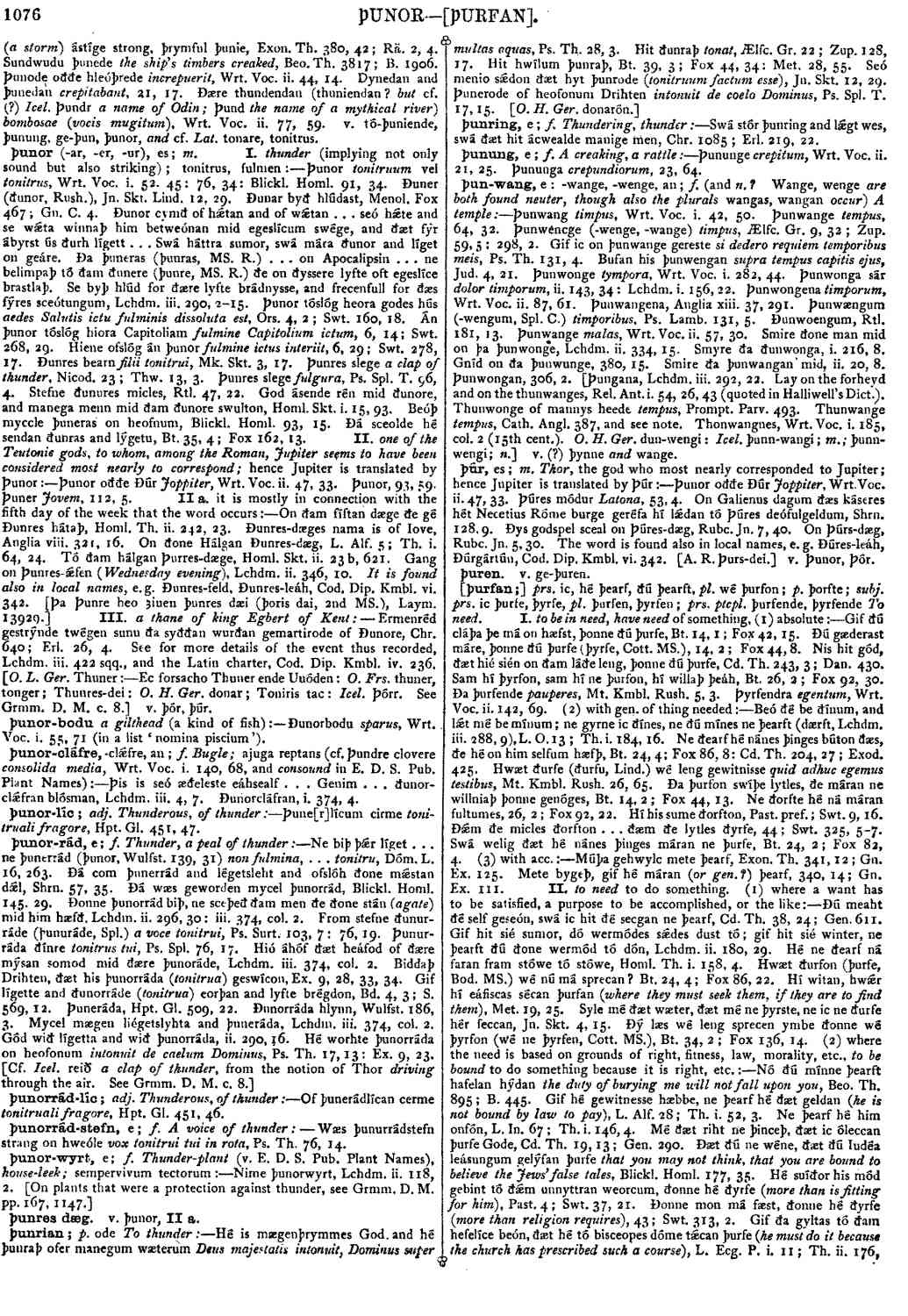þunor
- noun [ masculine ]
-
Þunor
tonitruum vel tonitrus,
- Wrt. Voc, i. 52, 45: 76, 34: Blickl. Homl. 91, 34.
-
Ðuner (ðunor, Rush.),
- Jn. Skt. Lind. 12, 29.
-
Ðunar byð hlúdast,
- Menol. Fox 467 ;
- Gn. C. 4.
-
Ðunor cymð of hǽtan and of wǽtan ... seó hǽte and se wǽta winnaþ him betweónan mid egeslícum swége, and ðæt fýr ábyrst ús ðurh lígett ... Swá háttra sumor, swá mára ðunor and líget on geáre. Ða þuneras (þunras, MS. R.) ... on Apocalipsin ... ne belimpaþ tó ðam ðunere (þunre, MS. R.) ðe on ðyssere lyfte oft egeslíce brastlaþ. Se byp hlúd for ðære lyfte brádnysse, and frecenfull for ðæs fýres sceótungum,
- Lchdm. iii. 290, 2-15.
-
Þunor tóslóg heora godes hús
aedes Salutis ictu fulminis dissoluta est,
- Ors. 4, 2 ;
- Swt. 160, 18.
-
Án þonor tóslóg hiora Capitoliam
fulmine Capitolium ictum,
- 6, 14 ;
- Swt. 268, 29.
-
Hiene ofslóg in þunor
fulmine ictus interiit,
- 6, 29 ;
- Swt. 278, 17.
-
Ðunres bearn
filii tonitrui,
- Mk. Skt. 3, 17.
-
Þunres slege
a clap of thunder.
- Nicod. 23 ;
- Thw. 13, 3.
-
Þunres slege
fulgura,
- Ps. Spl. T. 96, 4.
-
Stefne ðunures micles,
- Rtl. 47, 22.
-
God ásende rén mid ðunore, and manega mean mid ðam ðunore swulton,
- Homl. Skt. i. 15, 93.
-
Beóþ myccle þuneras on heofnum,
- Blickl. Homl. 93, 15.
-
Ðá sceolde hé sendan ðunras and lýgetu,
- Bt. 35, 4 ;
- Fox 162, 13.
-
Þunor oððe Ðúr Joppiter,
- Wrt. Voc. ii. 47, 33.
-
Þunor,
- 93, 59.
-
Þuner Jovem,
- 112, 5.
-
On ðam fíftan dæge ðe gé Ðunres hátaþ,
- Hontl. Th. ii. 242, 23.
-
Ðunres-dæges nama is of Iove,
- Anglia viii. 321, 16.
-
On ðone Hálgan Ðunres-dæg,
- L. Alf. 5; Th. i. 64, 24.
-
Tó ðam hálgan Þurres-dæge,
- Homl. Skt. ii. 23 b, 621.
-
Gang on Þunres-ǽfen (Wednesday evening),
- Lchdm. ii. 346, 10.
-
It is found also in local names, e.g.
Ðunres-feld. Ðunres-leáh,
- Cod. Dip. Kmbl. vi. 342.
[Þa Þunre heo ȝiuen þunres dæi (þoris dai, and MS.),
- Laym. 13929.
-
Ermenréd gestrýnde twégen sunu ða syððan wurðan gemartirode of Ðunore,
- Chr. 640 ;
- Erl. 26, 4.
- Lchdm. iii. 422 sqq. ,
- Cod. Dip. Kmbl. iv. 236.
Bosworth, Joseph. “þunor.” In An Anglo-Saxon Dictionary Online, edited by Thomas Northcote Toller, Christ Sean, and Ondřej Tichy. Prague: Faculty of Arts, Charles University, 2014. https://bosworthtoller.com/32236.
Checked: 1